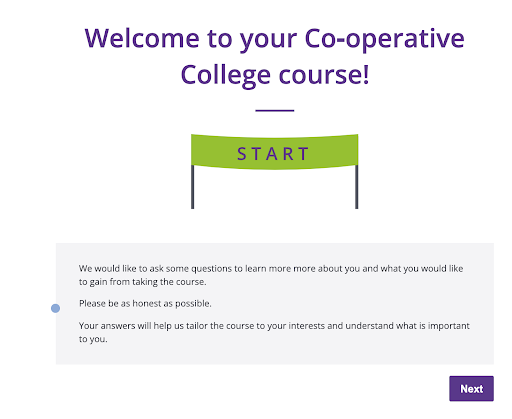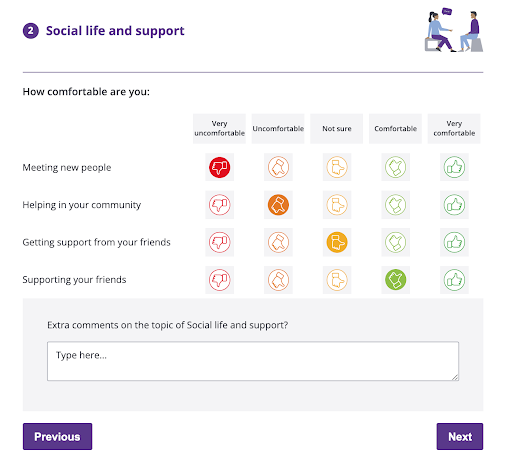A transition to digital delivery of educational content
Like most of the world, the COVID-19 pandemic saw the Co-operative College move the majority of their classes online, including the (Ad)Ventures scheme. The lack of in-person contact resulted in new and interesting challenges around obtaining student feedback. In particular, that existing mechanisms produce too high an administrative load on coordinators, whose responsibility it has become to manually collect and analyse the data and make it visible to other staff members.
The Co-operative College, founded over 100 years ago, is an educational charity dedicated to promoting a fairer world. Their (Ad)Ventures scheme teaches valuable life skills to young people with additional support needs across the UK. It gives young people access to local businesses and other opportunities and teaches them about co-operative values and entrepreneurship.
We were delighted to receive funding for this project through the National Lottery’s COVID-19 Digital Response, delivered by CAST on behalf of the Catalyst network. The programme was set up to fund urgent digital solutions intended to support the most vulnerable communities.
Our contributions
Remote co-design workshops with students and programme leaders
The timing of the project gave us the opportunity to fine-tune our inclusive, remote co-design process. We conducted a series of workshops over Zoom, which were designed to take into account the varying preferences of the Co-operative College’s staff and students. Attendees were able to give input in ways that they felt comfortable with, be that using audio, webcams, or text chat. User journey mapping with staff and programme leaders allowed us to understand their existing feedback process, so we could analyse pains and identify opportunities for improvement. In parallel, we conducted workshops with students, to hear about their preferred methods of giving feedback.
Building an accessible digital feedback tool
These workshops made it clear that, in order to ensure the long-term success of their programmes, we would need to work with the Co-operative College to streamline their feedback process. Using mockups, we were able to test how effectively different solutions could resolve their problems. This quick, cost-effective approach to testing the outputs of co-design ensures the best outcomes before we even begin developing.


These experiments informed the features we would include in our digital prototype – a central, accessible web app that collects feedback at the start and end of a programme, in addition to the end of every session. We designed the feedback questionnaires in line with WCAG guidelines and built them to be compatible with screen readers and keyboard shortcuts. To facilitate comprehension, we made the decision to incorporate icons to the standard Likert scale, with specific rating images and scales chosen by the students.
The prototype also gives staff access to an admin dashboard that creates visual representations of students’ responses. This allows them to interpret the data, spot areas for concern, and find opportunities to further improve their programmes.
Iterating based on user testing outcomes
Using the digital prototype, we conducted user testing sessions with students. We sought additional funding, which we used to iteratively improve the accessibility of the web app, based on the students’ input and recommendations. This improved version was used in our final co-design engagement. During this engagement, intended to validate the tool’s efficacy, Co-operative College staff gave feedback on both the forms and the response visualisations.
Varied requirements between programmes
We came to realise that there was a general need for the feedback forms to vary between programmes, which gave rise to the final phase of the project. This time, our main focus was to understand how the tool could be adapted and used more widely throughout the College to collect feedback and identify potential challenges. We conducted two more workshops with staff to understand how feedback requirements vary across the college. These, combined with our research findings, allowed us to create a report detailing the design opportunities for improving feedback. For each of these, we pointed out questions that remain unanswered and gave our recommended next steps for the College.
Ongoing improvements
The feedback collected from students is an essential metric to measure impact, improve user experience, obtain funding and ensure their programmes meet user needs. For these reasons, the Co-operative College is now seeking further funding to continue this work, and implement our recommendations. We have loved working with an organisation that shares so many of our values.
More information about the project is available in this article.